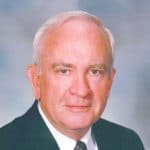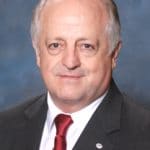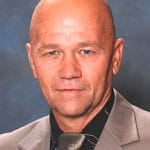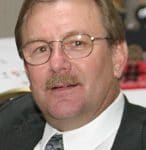
(1991-1995)
Having served as a member and as chairperson of UTU national negotiating committees, and as a UTU International officer for 28 years, I found that the failure to reach an agreement on the national level carries the risk of having third party recommendations placed in effect by Congress.
In my 36 years of service, those decisions by Congress never were in favor of the worker – even when Democrats controlled both the House and Senate.
In today’s increasingly conservative and anti-labor political climate, allowing a presidential emergency board and Congress to determine our contract terms would be the same as our adopting the Section 6 notices of the carriers.
No national agreement has ever been perfect. This agreement is extraordinary in terms of what other labor unions have been able to achieve. A failure to ratify this agreement could be devastating to our membership.
Assistant President Arty Martin

That cap alone is worth more than $5,000 over the life of this agreement. In fact, not a penny of the wage increases negotiated is to be offset through higher health care insurance contributions for 6½ years, which is 1½ years beyond the term of this agreement. For many members, there could be a reduction in out-of-pocket costs for doctor visits and prescription drugs.
In addition to the 17-percent wage increase, which is actually 18.24 percent when compounded, we have negotiated additional pay for every FRA-certified job, a faster process for new hires to reach full pay, cash payments to those still under the five-year service scale, no work rules concessions and a process for local negotiations on alternative compensation, compensation enhancement and electronic bidding and bumping.
General Chairperson (NS GO 680) Pate King

I shudder to imagine what the current anti-labor chairman of the House Transportation & Infrastructure Committee, John Mica (R-Fla.), might have in store for us if we vote down this agreement and turn our fates over to third parties.
This agreement deserves to be ratified on its merits. It is the very best agreement we could gain in this difficult economic and political environment.
International Vice President Delbert Strunk

Additionally, general chairpersons have the opportunity to negotiate issues on the property relative to electronic bidding and bumping, as well as enhanced benefits. This is especially important for NS and CSX committees.
Every cent that could be gained at the negotiating table was squeezed from the carriers. No other organization has done better, period! This agreement should be ratified by our members.
International Vice President Robert Kerley

All this is without any work rule concessions that have historically accompanied such gains. I wholeheartedly endorse this proposal for ratification.
General Chairperson (CSX GO 049) John Lesniewski

increase (18.24 percent when compounded), certification pay and a condensed new-hire service scale for the alternative of an imposed settlement decided by a third party. Historically, having a third party-imposed settlement has fared poorly for labor.
Entering these negotiations, I didn’t anticipate we could roll back our members’ health care contributions to $200 monthly and freeze them for 6½ years. The health care cost issue isn’t going away, and we met it head on, minimizing the impact on UTU members in a responsible way.
We cannot simply bury our heads in the sand and ignore the current state of the economy, escalating health care costs, the high unemployment rate, and recent wage and health care settlements made by other organizations that are well below what we have negotiated.
Alternate International Vice President Doyle Turner
 Our members need to consider today’s double digit increases in health care costs.
Our members need to consider today’s double digit increases in health care costs.I fully support this proposed agreement and urge a “yes” vote.
National Legislative Director James Stem

Also to be considered is how the U.S. House of Representatives, controlled by political extremists, is attempting to reduce Railroad Retirement, Social Security and Medicare benefits, eliminate Amtrak and slash transit subsidies.
It would not be wise for us to ask Congress, already in gridlock over economic issues, to legislate an agreement based on recommendations of a presidential emergency board.
Workers are under sustained attack. This agreement provides significant financial improvement and economic stability for our families. Any other option would be a big gamble we cannot afford to take.